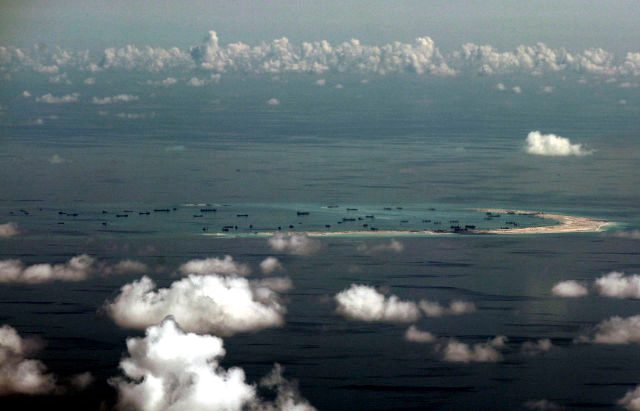SUMMARY
This is AI generated summarization, which may have errors. For context, always refer to the full article.

WASHINGTON DC, USA – China is on its way to securing “de facto” control of the South China Sea, a top US admiral warned Thursday, February 25 amid growing unease over Beijing’s continued military build up in the contested waterway.
By building air bases and hardened bunkers on tiny islands, some of which are reclaimed from the sea, and by installing sophisticated radar and missile defense systems, China has shown it is determined to achieve military primacy in the region, Admiral Harry Harris said.
Beijing’s claims to almost all of the South China Sea are widely disputed and the body of water has long been viewed as a potential flashpoint.
“If China continues to arm all of the bases they have reclaimed in the South China Sea, they will change the operational landscape in the region,” Harris told Pentagon reporters.
“Short of war with the United States, China will exercise de facto control of the South China Sea.”
Harris, who heads up the US Pacific Command, visited the Pentagon after several hearings in Washington at which he warned lawmakers about the pace of China’s maritime militarization.
“Harris is raising alarm about what could happen if there’s not sufficient push back, that’s what he’s trying to provoke here, a more robust response from the region and outside the region,” said Bonnie Glaser, a senior Asia advisor at the Center for Strategic and International Studies. “The US cannot do this alone.”
China is using dredgers to turn reefs and low-lying features into larger land masses for runways and other military uses to bolster its claims of sovereignty in the region.
Satellite imagery released this week shows Beijing is installing radar gear, and China has also deployed surface-to-air missiles and lengthened a runway to accommodate fighter jets on one islet, Woody Island, in the Paracels.
Beijing appears to be preparing what is known as an Air Defense Identification Zone (ADIZ) over the entire South China Sea, through which it can militarily query any vessel or aircraft.
“I am concerned about the possibility that China might declare an ADIZ,” Harris said. “I’m concerned about it from the sense that I would find that to be destabilizing and provocative.”
Still, he noted, the United States would ignore any such designation.
Freedom of navigation
General Joe Dunford, who is the chairman of the joint chiefs of staff and America’s top officer, earlier on Thursday told lawmakers that he worried China wants to hamper the United States as it operates in the region.
“It’s very clear to me that those capabilities that are being developed are intended to limit our ability to move into the Pacific or to operate freely within the Pacific, and we call that anti-access, aerial-denial capabilities,” Dunford told the US House Appropriations Committee.
The United States has repeatedly said it rejects China’s claims of sovereignty in the South China Sea, and since October has carried out two high-profile “freedom of navigation” operations in which it sailed two warships within 12 nautical miles of islets claimed by China.
“We need to, and we must, continue to exercise our rights of freedom of navigation in international waters and airspace,” Harris said, adding that “like-minded” nations should do the same.
Defense Secretary Ashton Carter said China’s military presence in the South China Sea was increasing the risk of “miscalculation or conflict” between regional countries.
“Chinese behavior is having the effect of self-isolation, and it’s also galvanizing others to take action against it,” he told the House Appropriations Committee.
Carter said other nations in the region are responding by stepping up their own maritime defense activities and aligning themselves with the United States.
“Old allies, like Japan, South Korea, Australia and the Philippines, and then new partners, like Vietnam and India, that are working with us increasingly,” he said.
The South China Sea is a vital waterway through which trillions of dollars of cargo flow each year, much of it destined for the United States. – Thomas Watkins, AFP/Rappler.com
Add a comment
How does this make you feel?
There are no comments yet. Add your comment to start the conversation.